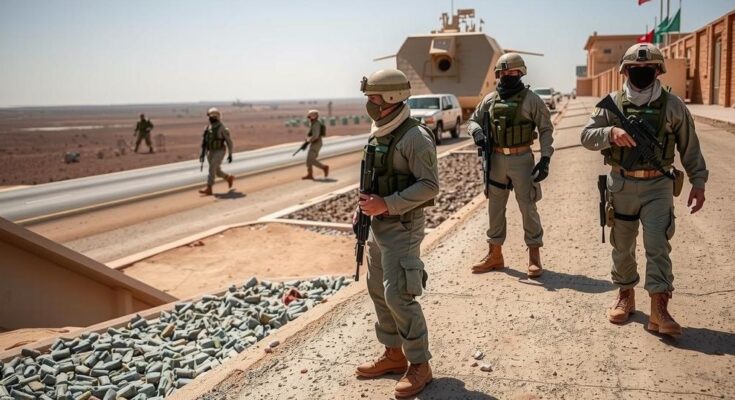Jordan has increased military operations against drug smuggling networks linked to Iranian-backed groups, including airstrikes on production facilities in Syria. This escalated response addresses the growing drug crisis, particularly involving Captagon. Jordan’s strategic shift highlights broader regional security implications and ongoing collaboration with Syrian authorities to combat these threats.
Jordan has intensified its military operations along the northern border with Syria, particularly targeting drug smuggling networks linked to Iranian-backed factions including Hezbollah. This decisive shift to heightened military engagement is a response to escalated violence from armed groups attempting to cross into Jordanian territory. Recent confrontations, including a notable clash on January 12, 2025, have underscored the urgency of Jordan’s actions, with the military identifying organized networks influenced by Iran that are involved in drug and arms trafficking aimed at destabilizing the region.
This robust response now includes conducting airstrikes on drug production facilities in southern Syria, representing a strategic pivot from prior diplomatic initiatives to immediate military action. The Jordanian government has characterized these efforts as a “war on drugs,” emphasizing the critical need to safeguard its borders in light of growing concerns about the prevalence of Captagon, an addictive substance heavily trafficked by criminal syndicates and militia groups.
As detailed in various reports, these drug trafficking networks based in southern Syria are closely related to Iran’s proxy forces, such as Hezbollah, and have historical ties to the Fourth Division of the Syrian Army, previously commanded by Maher al-Assad. Before the Assad regime’s debilitation, this division played a crucial role in facilitating the drug trade. Recent actions by the new Syrian government indicate a commitment to address this crisis by dismantling numerous drug laboratories once under the Fourth Division’s protection.
Extensive documentation by UN experts and Western authorities has reaffirmed that the illicit trade of Captagon serves as a significant financial resource for Iranian-backed militias. Jordan, in conjunction with its allies, has accused Hezbollah and other factions of exploiting southern Syria as a strategic hub for smuggling, further complicating regional stability efforts. A recent security agreement between Jordan and the nascent Syrian government has strengthened joint initiatives to combat cross-border smuggling, resulting in numerous raids on drug manufacturing sites. However, the magnitude of these operations, along with the substantial financial incentives tied to drug trafficking, poses persistent challenges for both nations.
Moreover, Jordan’s operations signify a recognition of the wider security threats arising from the convergence of narcotics trafficking and militia activities. A Jordanian military official remarked on this pressing concern, asserting that “this is not just a border issue; it is a national security imperative,” highlighting the pervasive influence of Tehran-funded networks in ongoing regional destabilization.
The escalation of Jordan’s military operations along its northern border with Syria reflects the growing threat posed by drug smuggling networks linked to Iranian-backed militias. These illicit activities, especially involving Captagon, have become integral to the financial strategies of these groups, fostering instability in the region. The historical context includes previous relationships between these smuggling operations and the Syrian military’s Fourth Division, exacerbating the challenges faced by both the Jordanian and Syrian governments in curbing drug trafficking and associated violence.
In conclusion, Jordan’s intensified military actions against Iranian-linked drug smuggling networks signify a critical shift in its security strategy amid a growing regional crisis. The country’s efforts focus on dismantling organized operations that threaten national stability and public safety while also addressing the broader implications of drug trafficking intertwined with militia activities. The strategic partnership with Syria appears vital in combating these threats, although significant challenges remain in effectively managing the scale of the drug production and trafficking continuum.
Original Source: www.ncr-iran.org




